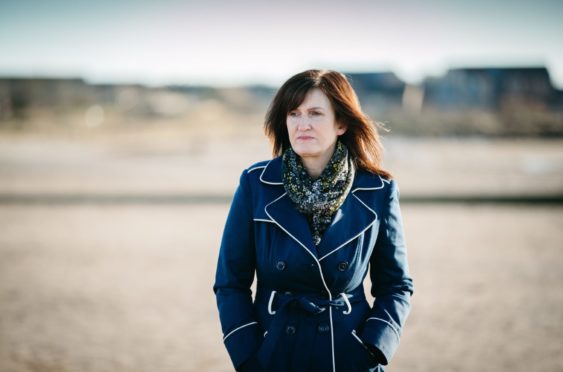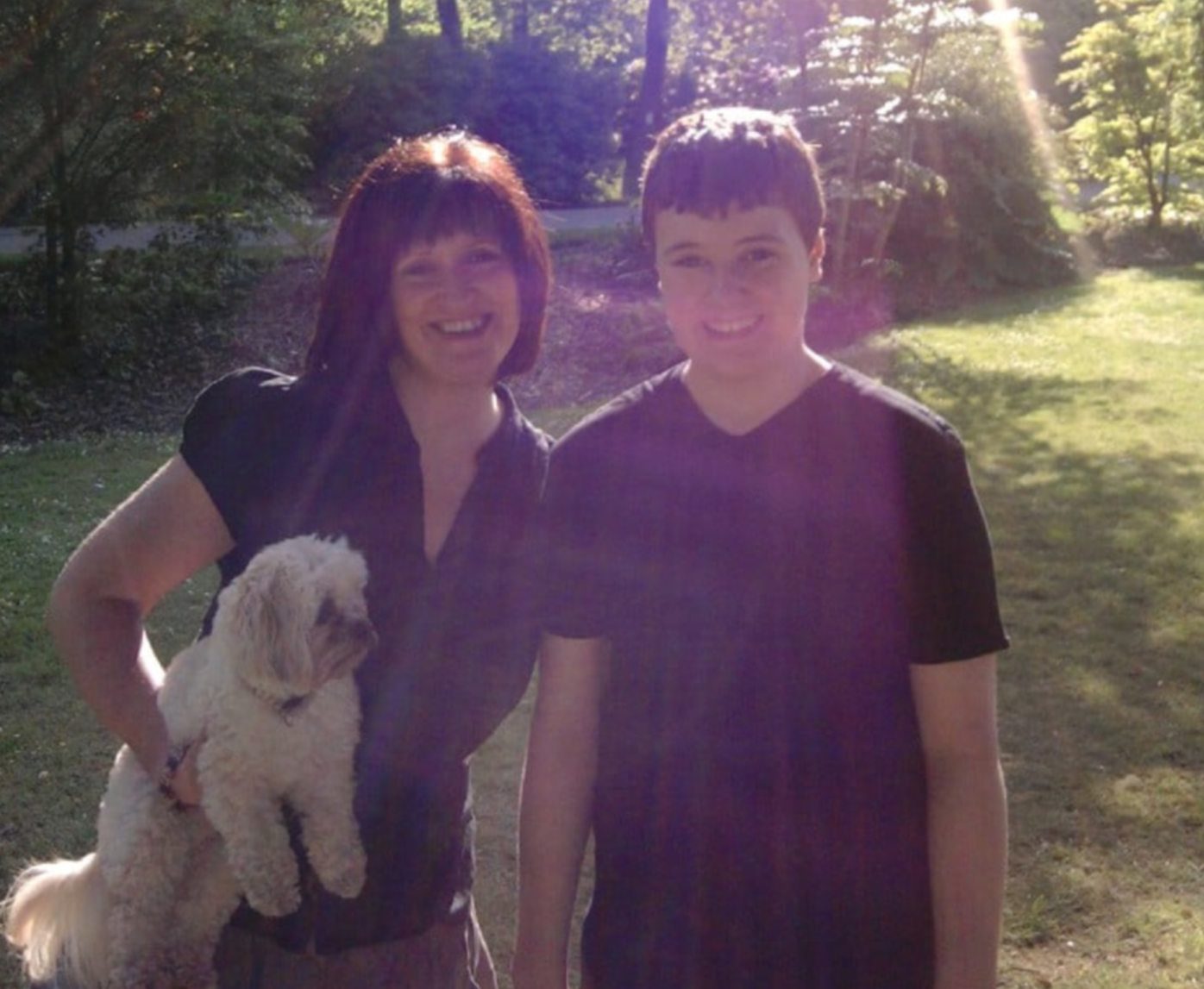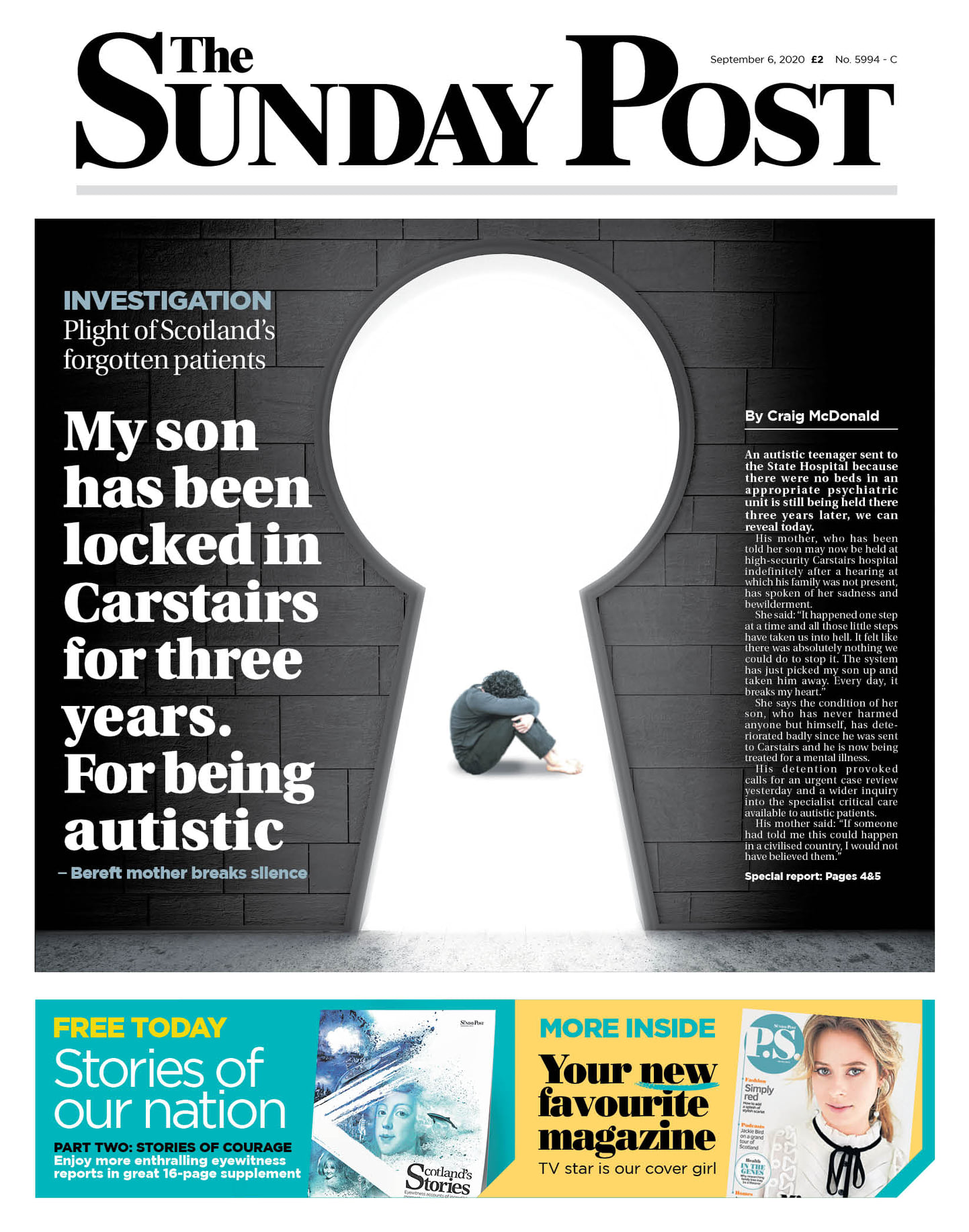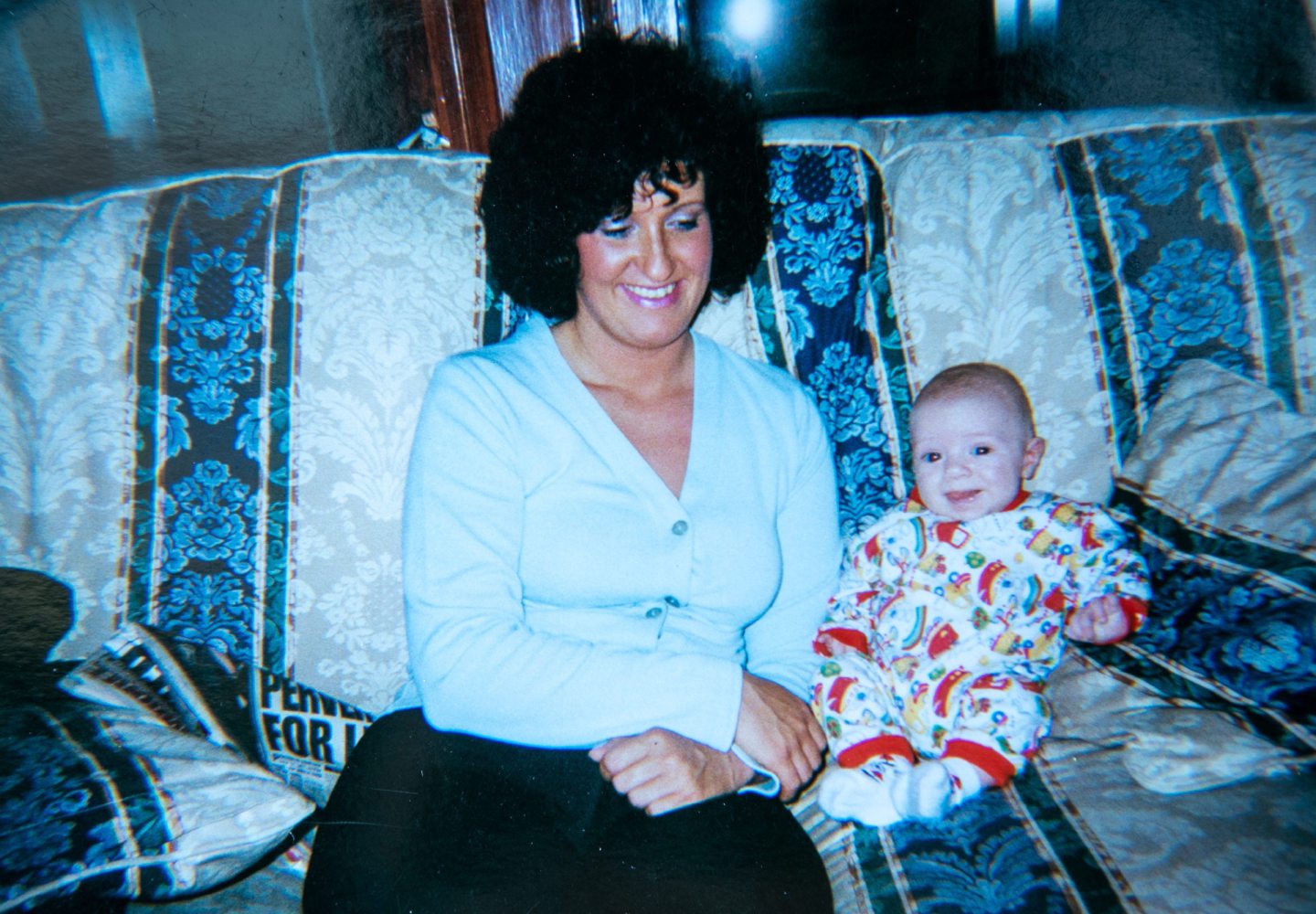
Ruth Hughes should have been taking her autistic son to visit one of his favourite castles last week or enjoying a walk together on the beach near his home.
It was Gordon’s 23rd birthday but, instead of celebrating with his family, the young man his mum describes as a “loveable, loving boy”, is locked in a maximum security hospital and, according to her, drugged to the point where he struggles to speak and spends most of the day in bed.
Diagnosed as a child with attention deficit hyperactivity disorder, autism and a learning disability, Gordon has spent the past three years in the State Hospital at Carstairs – Scotland’s most secure hospital for patients most at risk of harming them- selves or others – despite never having hurt another person.
We told Gordon’s story in September, without identifying him, to highlight the plight of patients with autism being held in secure hospitals where, their families fear, their mental health worsens. Today, Ruth speaks out as she campaigns for her son’s diagnosis and treatment to be reassessed.
“Gordon was a loveable, loving, funny child and was no problem,” said Ruth, of Ayrshire. “We went everywhere together and, as he got older, he loved watching action films with his dad. He was placed on medication as a child but experienced problems in his teens. Around 17, he was prescribed a different drug, aripiprazole, but experienced adverse side effects.
“Looking back, I didn’t know much about mental health and just assumed the drugs would help. I was wrong. There was an episode in 2017 where he self-harmed following a minor confrontation with someone in the street. We sought help and Gordon went to a local hospital.
“A doctor recommended he move to a medium secure hospital but, to our shock, he was sent under ‘exceptional circumstances’ to Carstairs instead as there were no medium secure beds available. We thought it would be temporary. Instead, Gordon has gone in and might never come out.”
Ruth recounted a disturbing sequence of events that began days after he was admitted to Carstairs. She said alarm bells went off on one of her first visits when Gordon, then 19, appeared with his face “cut to ribbons” following what staff told her was a “restraint”.
She said: “I couldn’t believe what I was seeing but Gordon said, ‘it’s all right mum, don’t cry’. I went to hold his hand and one of the staff said, ‘don’t touch him’. I was in disbelief at this environment. I said, ‘he’s only 19’, and asked them to let me hug him but they just stared at me.”
Six months later, Gordon was assaulted by a fellow patient while staff did nothing to halt the violence. The March 2018 attack only came to light after being reported by a housekeeper left in tears at what she’d witnessed. Two members of staff were sacked but Ruth only found out the full details in a press report six months after the attack.
She said: “We heard of staff involvement in an attack on an autistic boy in Carstairs. I realised it was Gordon and was physically sick. Not one person at the hospital explained to us what happened or apologised.
“A few weeks after he was attacked, a psychiatrist gave Gordon a diagnosis of schizophrenia. I am certain Gordon is not schizophrenic and we’d also been told previously by doctors that he’s not. The problem, in my opinion, was that an autistic boy had been attacked and was traumatised. Gordon told me, ‘mum they keep asking if I hear voices and I keep saying no’, but they proceeded with the diagnosis.”
Things deteriorated further and, in 2019, Gordon was placed on a restriction order by a court which means he can be held in Carstairs indefinitely. Ruth said their lawyer told them beforehand of the hearing, called an examination of the facts, but that they had no idea of its significance or that it could lead to Gordon being detained indefinitely.
Further medication has followed, including Gordon being placed on the same anti-psychotic drug that his mum said previously caused negative side effects. Ruth said: “He has lost his hair and aged terribly since being locked in Carstairs. Gordon has autism and needs the care of his family, not the regime of medication and restraint in which he finds himself.
“I have seen Gordon once since September and my stomach flipped at his condition. He was so drugged he could barely communicate and he just said, ‘oh mum, please get me out of here’. I told him I loved him and he said he loved me. Since that visit, on December 16, we have been told Gordon now does not wish to speak to us. I find it impossible to comprehend, as I’d spoken to him on the phone daily beforehand and it brightened his day.
“We were contacted around Christmas by staff to say Gordon had received two greetings cards, sent by friends of mine, but that Gordon told staff he didn’t know the people who’d sent them.
“Staff told us, as a result, they disposed of the cards. Gordon had the worst Christmas imaginable and a couple of cards might have brightened his room. I find it hard to believe the approach from the State Hospital.”
Gordon will have a mandatory mental health tribunal, via teleconference call because of Covid, in March which could sanction a move home or to another hospital but Ruth fears his current medication level could inhibit such a release.
She said: “We have been told Gordon is refusing his daily walk and is getting little or no exercise. He just lies in there drugged. After three years, I am speaking out in hope and desperation that something can be done. We are living a nightmare and I want people to understands the situation in which my poor son finds himself.
“My husband and I have been to parks where we used to go with Gordon and had to leave as all I could see was him playing there. The memories were too painful. It was Gordon’s birthday on Sunday and I should be taking him to a castle as he loves history and such visits. I said to him last year, ‘hopefully next year son we’ll have you home for your birthday and we’ll have a cake and a party’. It wasn’t to be and now I wonder where he’ll be next birthday.
“He was a bright, loving boy with his life in front of him and instead he has been reduced to an absolute mess since being sent to Carstairs. We just want our son home where he can be properly cared for but the system has taken him away from us.”
Campaigners have described the detention of autistic people in maximum security as a scandal and say the environment of medication and restraint is counter-productive to their care.
Alexander Burnett MSP, co-convener of the Scottish Parliament’s cross-party group on autism, has backed Ruth and said detaining people with disabilities at the State Hospital was Scotland’s “secret shame”.
The Scottish Government said it was reviewing mental health legislation “to determine if new measures are necessary to fulfil the distinct needs of people with learning disabilities or autism”.
The State Hospital said: “Due to data protection and confidentiality we are unable to provide any information on specific patients, past or present.”
When we initially reported Gordon’s case in September, the State Hospital said: “We can confirm there are no patients detained with autism as the only diagnosis. A patient would be considered for transfer once his mental health had improved and his behaviour was settled for a prolonged period.
“Our principal aim is to rehabilitate patients, ensuring safe transfer to appropriate lower levels of security.”
Call for an autism commissioner
A Scots commissioner is needed to champion the rights of people with autism and learning difficulties, according to leading charities.
Enable Scotland, National Autistic Society Scotland and Scottish Autism want the parties to commit to appointing the country’s first such commissioner in their election manifestos.
Charlene Tait, of Scottish Autism said: “Despite Scotland already having existing well-intentioned policies in place, the human rights of autistic people and people with a learning disability are still being failed.”
The Scottish Government said: “We will continue to consult people with a learning disability, and other stakeholders to explore further the potential role of a commission or commissioner.”

Enjoy the convenience of having The Sunday Post delivered as a digital ePaper straight to your smartphone, tablet or computer.
Subscribe for only £5.49 a month and enjoy all the benefits of the printed paper as a digital replica.
Subscribe © Supplied
© Supplied
 © Supplied
© Supplied